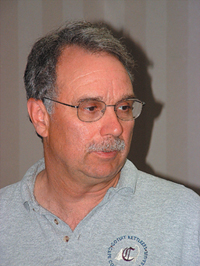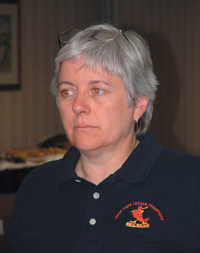|
Summertime GM a year-round job
For the general managers of the Cape Cod Baseball League’s 10 franchises, though, the “seasonal” jobs they hold from June through August are actually year-round endeavors. From helping to recruit the next year’s ball players, to mowing lawns and overseeing concession stands, the role of the GM is an all-year affair.
“It takes on different forms in different franchises,” explains former Brewster GM Sol Yas, now deputy commissioner and umpire-in-chief for the Cape League. “It depends on how much volunteerism there is in your club and how hands-on you want to be.” Yas, who was GM of the Whitecaps for seven seasons, recalls 12-hour days in midsummer that began with youth clinics in the morning, field maintenance in the afternoon, and actual game-night preparations come early evening. And that was before the game even started. Concession books to balance, housing to arrange, and players to nurture are all part of the experience, one that GMs say they feel fortunate to have. “The real benefits,” says Yas, “are the friendships you cultivate.” Introducing former Whitecap Sean Casey, now with the Cincinnati Reds, into the CCBL Hall of Fame, for example, is a moment that Yas deems “one of the real perks.” John Wylde has been a mainstay in the CCBL for decades. As an integral piece of the Wareham Gatemen puzzle, Wylde has held a number of positions over the last 21 years and has served as the team’s GM for half of that time. The changes Wylde has seen in the role of the GM have come as a result of changes in the league itself. Twenty years ago a GM was beholden to administrative tasks and paperwork, coordinating housing and jobs. Now, says Wylde, GMs work closely with coaches and scouts in trying to field the best possible team. “The relationship between the Cape League and Major League Baseball is a hand-in-hand one. Let’s face it. If someone could build a better mousetrap, that would be the end as we know it, so we must always think about strengthening our relationship with the Major Leagues,” says Wylde. “We have the responsibility to put out the true pro prospects, and that’s not something that just looking at statistics can tell you. It’s the old adage that it’s not what you know but who you know that is important.”
“There are actually more formalities now,” says Sturtevant, the Commodore GM for 17 years running. “You have to document everything, and some of that is driven by the NCAA and some by the league. But most importantly, you have to rely on a network of scouts and coaches who you respect to get the right players here.” When Sturtevant first took the reigns in 1988, the Falmouth team was working through a coaching staff change, which presented a huge challenge up front for the new front office. For the last several seasons, though, Sturtevant has worked closely with head coach Jeff Trundy, a situation that erases some early season question marks. “Having a consistency in the coaching staff makes that part so much easier,” says Sturtevant. “It’s one less thing to worry about.” But there are other concerns that a GM must tend to, even when other parts of the plan is in place. Ensuring that good citizens, as well as good ball players, grace the Cape fields each summer seems to be the biggest. “Every year you’re going to get a small handful of players who don’t really understand what they have here. Thankfully, so many of them do. There’s satisfaction in seeing the players go from here and become Major Leaguers, but the real satisfaction is seeing a kid who works hard, who has the same values as you do, who really wants to succeed here do well. To give a player that opportunity is tremendous.” As director of health for the Town of Yarmouth, Bruce Murphy works alongside other Cape League enthusiasts who have been bitten by the CCBL bug. In addition to his day job, Murphy estimates that he spends somewhere between 10 and 20 hours a week, year-round, on Cotuit Kettleers’ operations. “It’s a lot of administrative work and luckily, I enjoy that,” he says. “There are a lot of details. Then all of a sudden, something will change, and the details change, as well. You have to really enjoy it.” At the end of the Cape League season in August, planning for the next year begins anew. “You have an idea of who you would like to have the next year,” Murphy explains, “so you follow them through fall ball. I follow the players and make a spreadsheet, find out who’s healthy, how kids are playing.” “After you’ve given them a contract, it gets really interesting,” he continues. “You watch them through the spring season and follow the draft and Team USA. It’s never-ending.” Murphy says serving as GM for Cotuit has brought his whole family into the fold, and he has been involved with everything from housing players to doing week-end grass cutting duties at Lowell Park. “Everyone has to have a hobby,” he says, “and this is mine.” One that happens to also be a year-round endeavor. By Silene Gordon |


